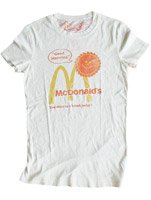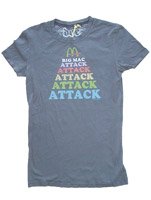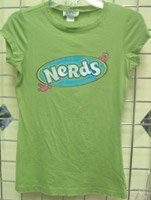You Wear What You Ate
Food-related apparel licenses keep the retro trend alive
The retro trend that brought us hoodies emblazoned with vintage video game graphics and luxurious Disney-inspired T-shirts is taking a gastronomical turn. Manufacturers and retailers alike are betting that consumers will buy apparel with their stomachs and fond food memories—and iconic food brands couldn’t be more pleased with their newfound fashion appeal.
“There is a definite uptick in the food and beverage license business, particularly with retro T-shirts,” said Cara Bernosky, president of IMC Licensing in Louisville, Ky., which brokered the deal between Oscar Mayer, a division of Kraft Foods, and Paul Frank Industries in 2004. “It’s part of a larger nostalgia trend we’ve seen over the last few years,” she said.Justin Watson, global marketing director at Los Angeles–based high-end T-shirt brand Doe by Mighty Fine, agrees. Doe specializes in creating T-shirt lines that combine icons and famous brands, from cartoon characters to Coca-Cola, with original art. “I don’t think it’s so much a food-related trend as it is a return to something comfortable and familiar. Everyone finds food comforting,” he said.
If that’s true, Doe scored a coup with its recent exclusive licensing deal with McDonald’s for a line of limited edition T-shirts for women. The line, which will bear images of the fast food empire’s characters (including Ronald McDonald, Grimace, the Hamburgler and Birdie), is set to pull heartstrings this spring in high-end boutiques and specialty retailers such as Lisa Kline, H. Lorenzo and Intuition in Los Angeles. “McDonald’s makes sense. People grew up with them and they’re an American icon—so there’s an emotional connection,” Watson said.
To create the shirts, which will be individually packaged in special Happy Meal boxes, Doe dove into the McDonald’s archive for authentic touches. The vintage screen prints and luxurious fabrications ratchet the retail price of each T-shirt to $50–$70.
Amy Lizotte, Lisa Kline’s director of public relations, is confident the line and others like it will sell well in the store. “They’re really cute, the cut is nice and they’re fun,” she said. The retailer is getting behind the retro food trend in a big way. On its Web site, long, clingy T-shirts bearing Tab and Coca-Cola logos are hot items, and T-shirts bearing old-school Fruit Loops and Frosted Flakes imagery are on the way.
The trend isn’t filler for Lisa Kline, which will give the Doe line high visibility. “We’re planning a huge window display for the Doe McDonald’s line,” Lizotte said. The plans call for a life-size Ronald McDonald to grace the window.
The kitsch factor of food-licensed apparel and the high-end fabrications keep the trend strong, Lizotte said, but she notes that the trend is limited mainly to T-shirts. “It’s not really fashion. The trend is really casual—you couldn’t cross over the trend to dresses or pants,” she said. For the most part, apparel manufacturers are sticking to T-shirts and fleece for their food-licensed apparel.
Other retailers have experimented with the trend and used it to promote themselves. Los Angeles–based manufacturer Liquid Blaino Designs worked in collaboration with General Mills and Los Angeles retailer Kitson to create a line of Cocoa Puffs cereal-inspired T-shirts bearing the tagline “Coo Coo of Kitson.”
Mass appeal
The retro food licensing trend isn’t limited to high-end fabrications. Juniors, men’s and mass marketers are also buying into the trend. Manufacturers say they will continue to pursue nostalgic food licenses in new and different categories.
Junior apparel brand Self Esteem jumped on the food-licensing trend early with the launch of a special division, Self Esteem Vintage, in 2003. The line debuted with Dubble Bubble, Abba Zabba and Fizzies branded apparel. The company announced new licensing agreements with Hershey’s, Pez, Sweet Tarts, Nerds, Laffy Taffy and Pixy Stix for Spring 2006.
“We feel this new line will take the vintage trend to a new level. Our customers have asked for retro looks and [we] will supply this overwhelming demand,” said Self Esteem Chief Executive Richard Clareman in a statement. The two-year licenses are for T-shirts with screen-printed and foil-screened logos with some appliqueacute;s, glitter and rhinestones.
San Fernando, Calif.–based Jem Sportswear and Awake Inc. created retro food-license T-shirts for boys and men as well as women with Kellogg’s and Coca-Cola licenses. Using the same licenses, the company makes high-end, highly designed T-shirts for women under the Awake brand, and T-shirts for men and boys for mid-tier and mass market under Jem.
“The trend coexists from the high-end market to Target,” said Randi Kagan Spieker, the companies’ vice president of marketing. “The Coke and Kellogg’s brands appeal to a wide range of customers,” she said. Jem’s T-shirts feature the burn-out, sublimation prints or flocking used in the women’s versions. “The boys’ and men’s apparel is more logo-driven,” Kagan Spieker said.
Some brands lend themselves better to male clients. Watson said his company is looking to close licensing deals this February with Budweiser, Heinz and Miller. “Vice licenses are going to be strong,” he predicted, noting that the customer for liquor-related licenses is older than the typical novelty T-shirt client. “We’re targeting men 25 years old and over,” he said.
Walking billboards
For the owners of the food brands, the benefit of an apparel license is more marketing than monetary. Food licensers make negligible revenue on apparel licenses, according to Bernosky.
“The largest licensing revenue opportunity is taking a food or beverage license and taking it to another food product,” she explained. Apparel licenses give food brands “badge status” and generate priceless exposure, not revenue. “Licensing makes the brand hip, cool and relevant to the consumer,” she said, but doesn’t drive consumers to the grocery store in search of a favorite snack.
Randy Fricke, trademark license assistant manager at General Mills in Minneapolis, says apparel licenses give its brands additional touch-points with consumers. The company has had apparel licenses for T-shirts, loungewear, sweatshirts and yoga pants for close to a decade, Fricke said. “In the last year we’ve seen a significant increase in interest from licensees,” he said, noting that his department fields six to eight phone calls per month from manufacturers looking to license General Mills brands, which include Lucky Charms, Cheerios, Count Chocula, Betty Crocker and Green Giant.
“Most licensing deals are for two to three years,” said Mick Mankowski, president of SBL, a Santa Barbara–based brand development company. Licensers generally receive a guaranteed minimum royalty, typically in the 8 to 10 percent range, and may be paid quarterly, sources said.
Not all licenses are exclusive. For example, Coca-Cola has licensed its brand to numerous apparel manufacturers, including Awake Inc. and Doe. Some brands give one manufacturer the right to screen-print their logo on a T-shirt and offer another the right to use iron-on versions.
Canadian T-shirt maker Bang-On T-Shirts recently acquired the exclusive rights to create heat-press transfers of General Mills brands, including Trix, Cocoa Puffs and Hamburger Helper. Sales Manager Cameron Brass said food-related transfers constitute a good percentage of sales. The company, which holds licenses for a wide variety of pop-art transfers from music to Andy Warhol’s art, is “pursuing other food-related licenses, including soda pop,” Brass said.
Growing appetite
Analysts are divided on whether the trend is coming or going.
Mankowski thinks retro food licensing is just the tip of the iceberg of the general nostalgia trend. “You can see the throw-back trend in music, in action sports and in lifestyle markets—it’s not just in T-shirts,” he said. But, he said, the same momentum that carries the trend will also kill it. “When the trend is on [Los Angeles’] Melrose Avenue, it’s hot. When it’s in a discount store, it’s peaking,” he said. Tight distribution channels will help maintain a high aspirational value, he said, because “nothing kills a trend faster than overexposure.”
Still, retailers are ready for the influx of new product. “There is still a huge customer demand,” said Lisa Kline’s Lizotte.
Manufacturers continue to expand their food-licensing portfolios.
Self Esteem’s Vintage collection, which has been licensing food brands for three years, is committed to the trend. “We will pursue vintage licenses as long as Self Esteem continues to ride the nostalgia trend with cool graphics that have classic and timeless appeal,” said Molly Robbins, president of San Rafael, Calif.–based LicenZing LLC, Self Esteem’s licensing agency.
Awake Inc. and Jem Sportswear are adding vintage Kellogg’s imagery to their repertoire, including classic children’s cereals such as Frosted Flakes and Fruit Loops. They have also signed deals with Schweppes ginger ale, Sour Patch candies and Chiclets gum licensers.
Kagan Spieker, whose companies sell food-licensed product to specialty retailers and mass retailers alike, thinks the trend still has legs. “Food brands make up a nice portion of our portfolio,” she said. “I think the trend will be around for a while—as long as consumers continue to identify with the nostalgia of their youth.”
General Mills is still getting numerous offers from licensees—and the interest is showing no signs of waning, Fricke said. “So far as we’re concerned, the trend hasn’t peaked,” he said.
























